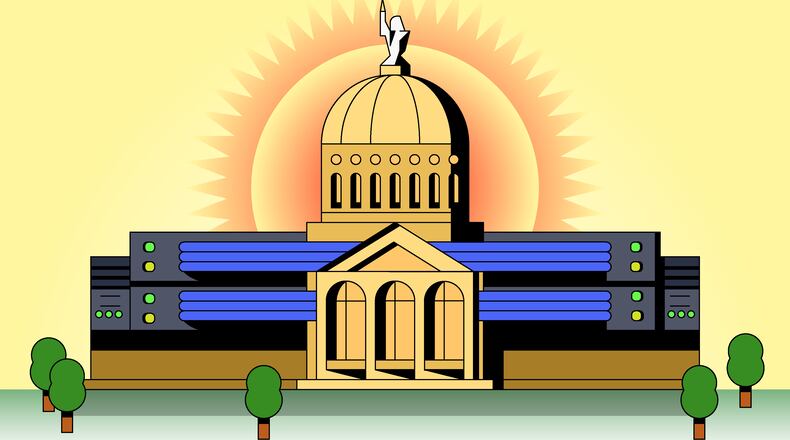Earlier this year, state legislators took aim at the data centers flooding Georgia with a bill that would require them to pick up their energy tab, sparking passionate debates about whether putting that in state law was necessary.
Driving the debate is what’s outside the window of Kecia Scott’s Fayetteville home: a gigantic nearby data center campus under construction.
“I find myself looking out the window right now, and these massive power lines are just hanging right in front of my window,” said Scott, 62.
Scott’s experience reflects growing frustrations with the rapid expansion of the facilities packed with rows upon rows of computer equipment powering artificial intelligence, cloud services and the internet.
State Sen. Chuck Hufstetler’s proposal requiring data centers to pay for their fair share of energy costs cleared the Senate Utilities Committee but fizzled out in the Rules Committee, never reaching the Senate floor for a vote.
Rules Chairman Matt Brass, R-Newnan, and other opponents of the measure said it’s the job of Georgia’s utility regulatory board — the Public Service Commission — to ensure residential customers are not picking up the tab for data centers.
“We’re giving the PSC authority, and then we’re coming back and saying, ‘All right, we don’t like it. We are going to overturn what you’re doing,’” said Brass, who voted against the measure.
It wasn’t the first time lawmakers took aim at the data centers. Last year, the General Assembly narrowly passed a two-year suspension on a lucrative tax break for the power-hungry facilities.
Gov. Brian Kemp vetoed the measure, saying it would undermine data center projects already underway.
Credit: Natrice Miller/AJC
Credit: Natrice Miller/AJC
Meanwhile, to keep up with the rapid growth, Georgia Power is planning massive infrastructure projects to serve the facilities.
The company has said that energy demands from data centers and other energy-intensive customers are driving most of the spending it expects through 2029 on new power plants and other infrastructure.
Are PSC rule changes sufficient?
The Senate Utilities Committee voted in favor of the data center bill, but only after hours of debate and testimony. Everyone seemed to agree that data centers should pay up. The clash was over how strict those regulations should be and whether they should be codified into law.
Before voting in favor of the bill, state Sen. Greg Dolezal, R-Cumming, remarked on the number of Georgia Power lobbyists talking to him about the bill.
“You guys have a lot of lobbyists that work for you,” he said. “And I’ve had more of them reach out to me within the past week, saying, ‘Please don’t pass this.’”
Georgia Power, data center industry groups and state regulators said PSC-approved rules with the same aim already protect customers from shouldering data center costs.
Credit: Drew Kann
Credit: Drew Kann
In December, Georgia Power requested billing rule changes to allow it to charge data centers and other large-load customers for the infrastructure they require. A month later, the PSC approved the changes.
Tom Bond, the PSC director of utilities, told lawmakers in February the commission is “philosophically” behind the legislation that would go a step further by requiring data centers to pay for their fair share of the energy they consume, but that cementing it into law could strip away “flexibility” the PSC-approved rule changes provide.
Meanwhile, consumer advocates, environmental groups and watchdog groups say the PSC-approved rules give Georgia Power too much slack.
“It provides no guaranteed protection for ratepayers,” said Robert Baker, a former PSC member who served on the board for 18 years.
Utility companies hold a lot of political clout under the Gold Dome. The Georgia Power State Employee PAC has about $592,000 on hand, according to its most recent campaign disclosure filing last week. It has spent about $429,000 since 2022 in campaign contributions.
Among Republican leaders in the Senate, then-Majority Leader Steve Gooch received more than $8,000 from the company since 2022. Brass accepted $7,500 in that same time frame.
Gooch, who has stepped down from that role to run for lieutenant governor, did not respond to a request for comment. Brass said the donations have “nothing to do with the way I vote.”
John Kraft, a spokesperson for Georgia Power, said the PAC provides employees with the opportunity to participate in the political process.
“Our employees are citizens and voters too, and we don’t infringe or influence their decisions to personally contribute to political candidates of their choosing,” said Kraft in a statement.
Electricity demands, rising bills
The debate comes as Georgia Power and the PSC face tough questions about rising energy bills.
The company’s residential ratepayers have seen their power bills surge after a series of PSC-approved rate hikes over the last several years.
Customers have seen their monthly electricity bills rise by about $43 to cover excess fuel expenses and to complete nuclear power generators at Plant Vogtle.
Earlier this month, the company struck a deal with the PSC to hold rates steady through 2028, months before two board members are up for reelection.
Members of the PSC have touted the freeze as a win for customers.
PSC Vice Chairman Tim Echols, who is up for reelection, said it shows that the commission is listening to ratepayers.
But the company intends to request approval from the PSC for a rate hike to recoup costs from Hurricane Helene and other storms. That, along with fuel expenses for other costs, could further drive up ratepayers’ bills.
Residential and commercial customers, Georgia Power has said, will not shoulder the costs to build out the necessary infrastructure for data centers.
Georgia Power customers are still feeling the squeeze of high energy bills. After three consecutive power bills last summer above $500, 70-year-old Mark Spivey of Atlanta said he was fed up.
Spivey, a volunteer for the consumer advocacy group People’s Power Union, which aims to hold the PSC and Georgia Power accountable, has since changed his energy habits to bring down his bill. Now, he turns off his air conditioning when he’s away from his house.
What’s next?
Hufstetler, a Republican from Rome, plans to give the proposal another shot in January, but if this year’s legislative session is any indication, it’s unlikely to pass in 2026.
Credit: Natrice Miller/AJC
Credit: Natrice Miller/AJC
And even if it reached Kemp’s desk, it’s unclear if he’d sign it into law. A spokesperson for Kemp declined to comment on the governor’s stance on the proposal.
Brass said he’s looking toward other states for inspiration and is considering legislation similar to a Texas bill signed into law by Gov. Greg Abbott. That law requires high-demand customers to help pay for the infrastructure they rely on and allows the state’s electricity managers to shut off power to energy-intensive facilities during emergencies.
But angst among some state lawmakers and regulators continues to grow, even for proponents who say data centers bring in jobs and property tax revenue for local governments.
“They’re losing a PR battle,” said Brass, referring to the massive warehouses being built near residential neighborhoods. “And it’s hard to be their friend when they keep going in these areas where people don’t want them.”
About the Author
Keep Reading
The Latest
Featured




